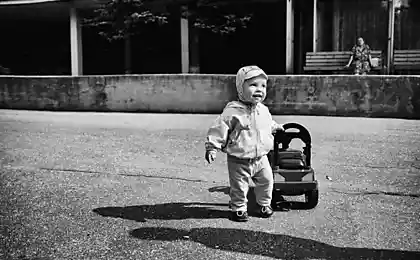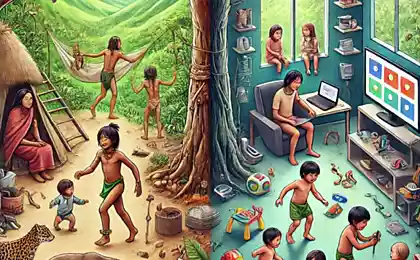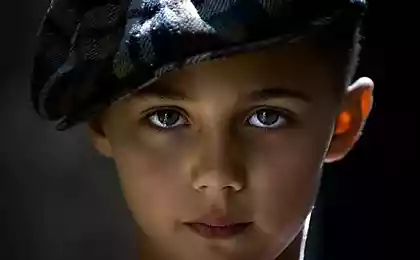1058
The differences in the education of the "wild" tribes and the "civilized" society from birth. Part 1
Forty three million four hundred fifty three thousand nine hundred ninety
How treat babies "savages"? In his book, Liedloff describes in great detail the details of their treatment of children:
With the birth of the Indian children are always present in any activities of their parents. From the moment the umbilical cord is separated from the child, his life has been full of events. Until the baby is mostly asleep but in a dream he gets used to the voices of the people of his tribe, sounds of their activity, pushes, sharp and unexpected movements and stops, to pressure upon various sites of his body when the parent changes position of the child, combining the current activity or rest with care of their child. The baby also learns rhythms of day and night, change of temperature, his body and pleasant feeling of safety and heat from a touch to a live flesh of the parent. The child realizes this urgent need only when it suddenly take away from a cozy body. His expectations of such events and confidence that he needs that kind of experience, supports the Mainstream of the tribe.
The baby feels its "rightness", and therefore only occasionally informs parents about their needs with crying.
During this, let's call it "manual" period (the period when the child is mostly in the hands of parents — approximately from birth until the moment when he starts crawling) the baby gets the experience that is consistent with its congenital expectations which are replaced then new, also demanding the corresponding experience. The baby moves very little and mostly remain in a relaxed, passive state. It is, of course, is not similar to a rag doll: muscle, of course, have the tone, but the child uses only a minimum of their muscle strength to observe what is happening, eating and bowel movements. He has another difficult task: hold in equilibrium the head and body (to watch, to eat and to relieve myself) in many different positions depends on the actions and poses of the person holding the baby.
Baby can lie on someone's lap and sometimes to touch the hands that are doing anything over it, for example, sewing, rowing oars in a canoe or prepare food. The child feels, how the knee suddenly bends, and the hand takes him by the wrist. The knee disappeared, and the hand began to compress even more, then she picks the kid up in the air, and soon he is in a new situation, adjoining to a body of an adult. Now the hand disappeared, and the elbow presses a body of the child to the thigh, to bend over and pick up something a free hand for a moment, the child appears in situation headfirst. Then the mother walked, ran, again went, the child thus feels different rhythms of movement and lots of aftershocks. Then, perhaps, it was transferred to another person, and the child had new feelings new body temperature, smoothness and skin smell, voice timbre, body type; maybe it's a bony old woman, can, the child with a shrill voice, and a man with a deep voice. Or the same child again raised one hand and plunged into the cool water, splashed and washed, then shook off streams of water with his hand. Hoisting his back on the wet thigh of an adult, which warms the child, while the rest of the body gradually cools the air. He feels the warmth of the sun or piercing wind cool, or both at the same time, when from the Sunny glade he suddenly falls into the shadow of the forest. The kid was almost dry, but suddenly the rain poured down and soaked him from head to toe. But at last he was home, the cold and the moisture was replaced by the warmth of the flames in the hearth that warms it up much faster than the mother's body.
Sometimes in the village there are General festivals, and the baby, already sleeping, feels rather abrupt shocks and jolts, while his mother jumps up and dances to the rhythm of music. During daytime sleep, it offers a similar adventure. At night, the mother sleeps with the child, as usual, touching him with his body, and he feels the movement, hears her breathing, and occasionally a quiet snore. She often wakes up, rises from his hammock and squeezing the child between thigh and torso, puts fire wood and raking the coals, keeping the fire in the hearth. If at night the child wakes up hungry and cannot find itself a breast of mother, he informs her about their needs. It gives it desirable, and the tranquillity without any efforts is again restored. Its qualified life events a little than differs from life of millions ancestors and answers its internal expectations.
The child's activity during "manual" period is very limited, but he gets a variety of rich experience, being on hands of the busy business person. As the expectations of the child are satisfied and it becomes psychologically developed and ready to receiving new experience, it gives a signal meaning change of expectations according to its internal impulses. These signals are correctly interpreted a congenital instinct of his parents. When a baby smiles and agukaet, it causes in parents pleasure and desire to provoke these remarkable sounds as often as possible and hear them as long as possible. Quickly elected the right way, which, encouraged by reaction of the child, repeats again and again. Later, as the repetition, this method does not cause the child of such delight, and its reaction lets know to the adult that that changed his behavior.
Then, the baby is already starting to throw up and catch almost to the ground. Then another, more complex manipulations, etc.
Thus, the sense organs of the child receive a huge and various material in the idea of events, objects and phenomena in order to train and improve their activities and to develop mental abilities. Because mental abilities of the child and his physical development are inextricably linked.
What is the baby of our "civilized" society?
"Civilized" the kid is no different from his wild counterpart: the same hands, feet, head. Despite the fact that in the last Millennium, we went the other way, millions of years of evolution remain common to Indians, and for us. A few thousand years, for that care from our bed has led to the emergence of "civilization", is extremely short compared to the millions of years of evolution. In such a short period the human nature could not in any meaningful change. Therefore human expectations are identical as to kids within a continuum, not having deprived ancestors, and for children whose birth, for example, by medication prematurely called the midwife, hurrying to a meeting with friends at the bar.
For many decades in our maternity hospitals doctors give the child to the mother immediately, but after a few minutes or even hours, when she at least subconsciously, already "in a state of mourning and grief". As a result the woman often feels guilty that they could not "be a good mother" to love his child and suffers from a notorious postnatal depression, the classical tragedy of the Western society whereas the nature prepared it to the most deep, exciting and joyful event in life — the birth of a child.
"The newborn child consumed by ancient desire of a touch to smooth, radiating heat, a live flesh, turn in a dry lifeless matter. Put it in a box that serves as a crib, and leave one, choking in tears and sobbings, in absolutely motionless imprisonment (for the first time in his carefree existence in the womb and millions of years of evolution his body is experiencing this frightening immobility). Everything that he hears cries of other victims of this inexpressible torture. Sounds for it mean nothing. The baby cries and cries; his lungs blaze burning air, and heart bursting with despair. But no one comes. Not losing faith in the "rightness" of his life, as inherent in the nature of, he does the only thing he until it turns out continues to cry. An eternity passes, and the baby drops into sleep.
Suddenly he wakes up in this mad and frightening, deathly silence and stillness, the screams. From feet to the head his body covers fire of thirst, desire and intolerable impatience. Gasping for air for breathing, the child shouts and screams; the shrill sound of his screams fills his head throbbing like an avalanche. He shouts to the wheezing in the throat, to chest pain. Finally the pain becomes unbearable, and the cries gradually weaken subside. The child listens. Opens palms, clenches his fists. Turns his head to one side to another. Nothing helps. It's just unbearable. He again exploded with sobs, but overworked throat again makes itself felt pain and wheezing, and soon the child calms down. He strains his desire racked body and finds in it some relief. Then he tries to wave his hands and feet. Stops. This creature can not think, can not hope, but already know how to suffer. Listens. Then fall asleep again.
Waking up, the baby wets the diaper, that somehow detracts from the suffering. But the pleasure from the process fluid and pleasant feeling of warmth, humidity in the lower parts of the body will soon disappear. The heat becomes motionless and is gradually replaced by a chilling cold. He moves his feet. Straining the body. Sobbing. Gripped by desperation, desire, a lifeless immovability, wet and uncomfortable, the baby is crying in her wretched solitude, yet not forgotten in a lonely sleep.
Suddenly, what a miracle, it lifted! The desires and expectations of small creatures, it seems, began to find its satisfaction. The wet diaper was removed. What a relief! Live, warm hands touched his skin. Lifted feet and wrapped up them a new dry, lifeless fabric. That's all. It's only been a moment, and it seems that was not at all and these warm hands, and wet diaper. No conscious memory there is no hope, even sparks. And again intolerable emptiness, timelessness, stillness, silence and desire, thirst. Nature has the instincts of a child resorting to extreme measures, but they are designed to fill gaps in the flow of proper treatment, or to signal for help to someone who is willing and able to provide it. The human nature has no ability of permission of such extreme situations. It is outside of its ample opportunities. The newborn, who lived a few hours, has gone beyond the saving forces of a mighty bed and is in complete confusion. His stay in the womb of his mother became the first and the last period of his life which could be called a state of continuous prosperity. Nature has laid in man is the expectation that in this state, he will spend the rest of his life. However, it could occur only provided that mother correctly addresses with your child and join with him in a mutually supportive and reciprocal relationship.
By the time when the baby is in his mother's house, he was already well versed in this life. For him, life will seem very lonely, stale and tolerant to its signals, full pain and suffering.
But the man did not give up. His life force now and yet he is alive and will try to restore the balance."
A mother and child are discharged from the hospital, and they go home. But for a child a little than differs from maternity hospital chamber except that the irritation and rash regularly grease with cream. The waking hours of the child are yawning, thirst and endless waiting for the "right" events at last will replace silence and emptiness. Sometimes, only for a few minutes in day, his insuperable desire of a touch, thirst of hands and movement turn away. She loves it with all unknown earlier tenderness. At first it is hard to put the child after feeding back in a bed, and especially because he so desperately shouts. But she is convinced that this must be done because if we give in to the child now, then he will grow spoiled and spoiled. She wants to do the right thing; in a moment it comes to the feeling that this small being on hands is more important than her and more than anything else.
She sighs and puts the child to bed, decorated with yellow ducklings and fit into the design of the entire nursery. She put a lot of effort, relying on fashion and advertising, to decorate it with soft easy curtains, a carpet in the form of a huge Panda to arrange with furniture: white Cabinet, baby bath and changing table with any powders, oils, soap, shampoo, hairbrush which are made in special children's color scale. On the wall hang pictures of cubs of different animals dressed as human beings. The drawers of the Cabinet filled with tiny blouses, pejamkan, shoes, hats, mittens and diapers.
The mother bends to kiss smooth as silk, a cheek of the child and leaves the room. The body of the baby shakes the first bloodcurdling scream. She quietly closes the door. She declared it a "war." Her will should win. Behind a door the sounds similar to shouts of the person under torture. Her inner voice tells her that the child is bad. If nature gives to understand that someone being tortured, the way it is.
Heart-rending cries of a child — not an exaggeration, they reflect his inner state.
The mother is confident that he really doesn't need anything, and so let him cry until you get tired.
Baby wakes up and cries again. When he gets tired and pauses for a moment mother opens the door, peeks in to make sure it is in place. Then quietly, as if fearing to Wake up in this false hope of attention, she closes the door and hurries to the kitchen where she works. The baby's cries gradually turned into a trembling moaning. As for the crying to no reaction (while the child expects help had long ago come), the desire to ask for something and to signal their needs already weakened and got lost in the desert of indifference. He looks up to the space around. Behind the railings of the crib is a wall. The light dimmed. But he can't roll over. And sees a stationary handrail and the wall. Heard meaningless sounds somewhere in the distant world. But there are no sounds, silence. He looks at the wall while his eyes are not closed. Opening them again, he finds out that handrail and a wall all in the same place, but light became even more muffled.
The eternal gaze of the handrails and walls is punctuated by the eternal gaze of handrails and ceiling. There is, on the other hand, there are any motionless forms. (dad told me that when I was a baby, "lived" in a separate room from their parents. For a change, he drew on the wall next to the crib geometric shapes, to me there was anything to see, maybe that's why I always liked in school ?)geometry
But sometimes the child can see the angle inside the carriages, and sometimes if you put it on the back, the sky, the inside of the roof of the carriages and from time to time a high-rise building, passing it at a distance. (One of my earliest impressions deposited in the memory is a plastic box inside the red pushchairs and types of any buildings from it. The parents were very surprised that I remember the color of the stroller and the presence of Windows on each side in it)
Adults often shake in the face of a child clattering objects, and the proximity of this movement and sound creates the impression that life absolutely nearby. The baby stretches hands and strikes on a rattle, expecting that just about will feel the "rightness" of its existence. Reaching for the rattle, the child suffices it and drags in a mouth. No, not at all. He waves his hand, and the rattle flies away. But right there the person returns a toy to it in hands. Over time the child understands that after that, throw the thing appears. He would like, that this saving figure appeared again and again therefore he throws a rattle or any other subject until the trick with the appearance of a man running. When the rattle ceased to come back into his hands, there was only empty sky and an internal part of the roof of the stroller.
But often it's rewarded with particles of life, when he starts crying in the stroller. The mother immediately starts to shake the stroller, realizing that it's kind of soothes the baby. His unbearable desire movement, the experience gained by his ancestors in the first months of life is reduced to shaking carriages, giving let poor, but still some experience and sensation. Voices nearby did not belong to him, and therefore have no value in terms of meeting expectations. But nevertheless these voices something bigger, than silence of the nursery.
To the "experts" who suggest to behave with the child about so true Benjamin Spock, whose books, unfortunately, I was brought up and many of my peers.
Items that adults put within reach of the baby intended for approximate substitution of the lost experience. All know that toys serve for calm of the little unfortunates. But for some reason nobody reflects, because of what he warrior cries.
The palm is holding a Teddy bear or any other soft toy, which you can "spoon" at night. (I know that my parents and the parents of most of my peers never took the children in his bed, in accordance with existed at the time the opinion that it is bad form. In addition, these parents have become grandparents, grumble if they knew that their children take the grandchildren to his bed to sleep together.)
So, bear need in order to provide to the child continuous presence of a close being. Gradually formed a strong attachment to a toy adults are inclined to consider rather as naive children's whim, and not a sign deprived of attention of the child who is forced to stick to an inanimate piece of matter that replaces his faithful and constant friend. Rocking in the stroller and the crib he is only a substitute for the necessary movement. But it is so poor and monotonous compared to that of a child at the hands of that hardly brings relief to the hungry by the movement of the lonely and abandoned being. Moreover, such a move is just a miserable sort of sense of life, it also happens very rarely. On the stroller and the crib, hang clattering, clanking and jangling when you touch the toy. They are usually painted in bright, flashy colors, wearing a rope, that was something to see except the walls and ceiling. Indeed, they attract the child's attention. But change them very seldom if at all change therefore these toys give nothing to the kid from the point of view of the diversity of visual forms and sounds.
The amount received by the child of experience necessary for development, this approach is practically zero, and its main feelings thirst and desire (something).
Millions of years kids on the cozy hands of mother was watching the dangers of the world, while their mother moved to Wade across the river, wandering among the forests, savannas and wherever. What's left for modern kids? The silence and stillness of cots or monotonous and generously relaxed cushions rocking strollers; plus it is sometimes possible to jump on an adult's knees, and if you're lucky, the father, who is still able to hear the voice of nature, throw the baby into the air.
Nothing in the history of the development of human ancestors didn't prepare the newborn for the fact that he will be left alone, he is awake or asleep, and even more so to leave one to cry.
1.2. What should be a natural childbirth and treatment of children
in their first months of life
Ukrainian Svetlana Bondar has created a beautiful book "Birth in the space of Love." In the free market I have found her and I brought her from Kiev via the Internet ordering. The book is about what due to be a natural childbirth at home and a kind of technique for parents who have decided to make their own in our world her baby in antenatal preparation and behavior of mothers and fathers in the birth process. It well shows what happens on a physical and on a subtle level of each of the participants birth.
After birth, the baby should immediately be put on the mother's belly, she stroked him, soothing. As soon as the newborn began to breathe independently, and the cord has completely stopped pulsing and was cut off painlessly, he immediately, without any delay on weighing, washing, inspection, etc., should give the mother's breast. It is in these moments, when birth is over, and mother and child met for the first time as two separate people, should be imprinting (imprint in the psyche of the child is first seen).
Humans unlike most animals in the inherent instincts, the need of imprinting, i.e. the mother feels the need to impress upon the psyche of their child, after all the human cub is too weak and helpless to follow someone, and the only contact he is able to maintain with his mother, is a scream, if his expectations are not satisfied.
This important mechanism of imprinting is so powerful and so deeply rooted in the nature of women that predominates over all her other impulses and reasons. Whatever tired and hungry was mother, whatever other problems it may hold, it is always first to feed and will caress the unsightly little man whom she sees for the first time. If this were not so, man would not have gone through all these hundreds of thousands of generations. Imprinting, an integral part of hormone-driven events of the delivery must happen immediately after birth, otherwise it will be too late.
The presence of imprinting in the chain of events — a necessary condition for the normal development of relations between mother and child.
What happens if the process of imprinting prevented and the child was taken from his mother at the exact moment when she was ready to caress the child, to give him the breast, to hold, hold you to my heart, or if the mother was drugged so much painkillers that she was not able to fully enjoy the communication with your child? In this case, the need for imprinting baby goes into the feeling of grief and loss. When time is lost, and the need has remained unmet, and within the framework of human nature assumes that the child "died" and the need for imprinting anymore.
Established during pregnancy a lasting, unbreakable bond between mother and child is sharply torn, when birth occurs in the conditions of the hospitals. Being in the womb, waiting for the kid was satisfied, therefore, after delivery, he expects that future expectations will be met
But many children of the past few hundred years, and in some cultures and segments of society several millennia, were deprived of the essential first experience, but it did not change expectations of newborns to appear immediately after birth in the breast of his mother.
Events occurring immediately after birth, produce human the greatest impression, than all the rest of my life. What meets the baby determines his attitude to life. Subsequent experience can only to a greater or lesser extent to Supplement this first impression received by the child when he still knew nothing about this world. At this point, his expectations are the most immutable of all that he ever will. The difference between the comfort of the womb and unfamiliar indifferent to the outside world is huge, but that man was born ready for a huge step — the transition from the womb into the hands of the mother.
The nature and experience of ancestors prepared a baby to that in the first months after birth it is mainly in the hands of parents. This time the "manual of the period" continues until the moment when the baby starts crawling. During this period, his consciousness is undergoing major changes.
Early experience forms a psychobiological structure of the person on all future life, and the earlier experience occurred, the stronger its influence.
At first the baby only observes, he cannot think. The consciousness of the baby differs radically from consciousness of the adult. The child cannot understand, what impressions correct and what is not. At the beginning of life after the birth of the first signals coming through the senses, creating an absolute and unconditional impression about a condition of things concerning only to congenital expectations of the baby and, of course, in no way connected with time.
Expectations of the child mix with reality, on ancient congenital expectations are imposed (but not alter or supersede their) expectations based on his own experience. The degree of discrepancy of the acquired expectations determines congenital how people deviate from the inherent potential in it to be happy.
Inherent expectations and received on the basis of the experience is not similar. Congenital expectations are unconditional until them regularly satisfy yet, while the acquired expectations which do not correspond congenital, have unpleasant smack of disappointment and are manifested as doubt, suspicion, fear of what future events will bring new troubles. The worst manifestation of this mismatch is an irreversible humility living conditions, not suitable to human nature.
All of these reactions are defending our Direction or Path of development, but humility because of the complete hopelessness dulls the basic expectations that will create the conditions in which new expectations can be successfully met.
The line of development interrupted in the place where there is no required experience (for example, if the child never sang the song, didn't listen to classical music or did not give a pencil in his early childhood, he is unlikely to become a a good musician or a talented artist). Some lines are interrupted in infancy, others in childhood, and the third life are successfully developing in accordance with the continuum.
The principle of continuity is that a person needs striping experience. The kid receives the experience answering to its congenital expectations which are replaced then new, also demanding the corresponding experience.
It is wrong to think about birth as about the moment of completion of the child as about a descent from the conveyor of the finished product, after all some abilities were born in the womb, and some will start to work much later.
Masaru Ibuka, in his book "After three too late" says:
"Children of men are born far less developed than the young of animals: he only knows how to shout, to observe and to suck milk. And young animals, such as dogs, monkeys or horses, are able to crawl, cling or even just to get up and go. Zoologists say that a newborn baby behind a newborn baby animal on 10-11 months."
The fact that the brain of a human newborn is not as developed as in animals, shows its immense potential. His brain, unlike the animals has not yet been formed and figuratively like a blank sheet of paper. From what is written on this sheet, depends on how fully a person will become a child.
"The period when connections between brain cells are formed most actively, is the period from birth to three years. At this time originates approximately 70-80% of such compounds. And as they develop, increase possibilities of the brain. In the first six months after birth, the brain reaches 50 % of its adult capacity, and to three years — 80 %. Of course, this does not mean that the brain of a child after three years ceases to grow. Three years basically matured back part of the brain, and by four years in this complex process enables the part which is called the "frontal lobe"".
You must always remember that the person napobrassica necessary for the development experience the various emotional, intellectual and physical ability may be at very different stages of development and at the same time combined with each other. All lines of development, terminated, or reached maturity, work together, but each waits for the experience meeting her requirements, and cannot develop further without this experience. Well-being depends largely on how the failure occurred and areas of development.
Part 2 — bashny.net/admin/2018/01/20/razlichiya-v-vospitanii-dikih-plemen-i-civilizovannogo-obschestva-s-samogo-rozhdeniya-chast-2.html
How treat babies "savages"? In his book, Liedloff describes in great detail the details of their treatment of children:
With the birth of the Indian children are always present in any activities of their parents. From the moment the umbilical cord is separated from the child, his life has been full of events. Until the baby is mostly asleep but in a dream he gets used to the voices of the people of his tribe, sounds of their activity, pushes, sharp and unexpected movements and stops, to pressure upon various sites of his body when the parent changes position of the child, combining the current activity or rest with care of their child. The baby also learns rhythms of day and night, change of temperature, his body and pleasant feeling of safety and heat from a touch to a live flesh of the parent. The child realizes this urgent need only when it suddenly take away from a cozy body. His expectations of such events and confidence that he needs that kind of experience, supports the Mainstream of the tribe.
The baby feels its "rightness", and therefore only occasionally informs parents about their needs with crying.
During this, let's call it "manual" period (the period when the child is mostly in the hands of parents — approximately from birth until the moment when he starts crawling) the baby gets the experience that is consistent with its congenital expectations which are replaced then new, also demanding the corresponding experience. The baby moves very little and mostly remain in a relaxed, passive state. It is, of course, is not similar to a rag doll: muscle, of course, have the tone, but the child uses only a minimum of their muscle strength to observe what is happening, eating and bowel movements. He has another difficult task: hold in equilibrium the head and body (to watch, to eat and to relieve myself) in many different positions depends on the actions and poses of the person holding the baby.
Baby can lie on someone's lap and sometimes to touch the hands that are doing anything over it, for example, sewing, rowing oars in a canoe or prepare food. The child feels, how the knee suddenly bends, and the hand takes him by the wrist. The knee disappeared, and the hand began to compress even more, then she picks the kid up in the air, and soon he is in a new situation, adjoining to a body of an adult. Now the hand disappeared, and the elbow presses a body of the child to the thigh, to bend over and pick up something a free hand for a moment, the child appears in situation headfirst. Then the mother walked, ran, again went, the child thus feels different rhythms of movement and lots of aftershocks. Then, perhaps, it was transferred to another person, and the child had new feelings new body temperature, smoothness and skin smell, voice timbre, body type; maybe it's a bony old woman, can, the child with a shrill voice, and a man with a deep voice. Or the same child again raised one hand and plunged into the cool water, splashed and washed, then shook off streams of water with his hand. Hoisting his back on the wet thigh of an adult, which warms the child, while the rest of the body gradually cools the air. He feels the warmth of the sun or piercing wind cool, or both at the same time, when from the Sunny glade he suddenly falls into the shadow of the forest. The kid was almost dry, but suddenly the rain poured down and soaked him from head to toe. But at last he was home, the cold and the moisture was replaced by the warmth of the flames in the hearth that warms it up much faster than the mother's body.
Sometimes in the village there are General festivals, and the baby, already sleeping, feels rather abrupt shocks and jolts, while his mother jumps up and dances to the rhythm of music. During daytime sleep, it offers a similar adventure. At night, the mother sleeps with the child, as usual, touching him with his body, and he feels the movement, hears her breathing, and occasionally a quiet snore. She often wakes up, rises from his hammock and squeezing the child between thigh and torso, puts fire wood and raking the coals, keeping the fire in the hearth. If at night the child wakes up hungry and cannot find itself a breast of mother, he informs her about their needs. It gives it desirable, and the tranquillity without any efforts is again restored. Its qualified life events a little than differs from life of millions ancestors and answers its internal expectations.
The child's activity during "manual" period is very limited, but he gets a variety of rich experience, being on hands of the busy business person. As the expectations of the child are satisfied and it becomes psychologically developed and ready to receiving new experience, it gives a signal meaning change of expectations according to its internal impulses. These signals are correctly interpreted a congenital instinct of his parents. When a baby smiles and agukaet, it causes in parents pleasure and desire to provoke these remarkable sounds as often as possible and hear them as long as possible. Quickly elected the right way, which, encouraged by reaction of the child, repeats again and again. Later, as the repetition, this method does not cause the child of such delight, and its reaction lets know to the adult that that changed his behavior.
Then, the baby is already starting to throw up and catch almost to the ground. Then another, more complex manipulations, etc.
Thus, the sense organs of the child receive a huge and various material in the idea of events, objects and phenomena in order to train and improve their activities and to develop mental abilities. Because mental abilities of the child and his physical development are inextricably linked.
What is the baby of our "civilized" society?
"Civilized" the kid is no different from his wild counterpart: the same hands, feet, head. Despite the fact that in the last Millennium, we went the other way, millions of years of evolution remain common to Indians, and for us. A few thousand years, for that care from our bed has led to the emergence of "civilization", is extremely short compared to the millions of years of evolution. In such a short period the human nature could not in any meaningful change. Therefore human expectations are identical as to kids within a continuum, not having deprived ancestors, and for children whose birth, for example, by medication prematurely called the midwife, hurrying to a meeting with friends at the bar.
For many decades in our maternity hospitals doctors give the child to the mother immediately, but after a few minutes or even hours, when she at least subconsciously, already "in a state of mourning and grief". As a result the woman often feels guilty that they could not "be a good mother" to love his child and suffers from a notorious postnatal depression, the classical tragedy of the Western society whereas the nature prepared it to the most deep, exciting and joyful event in life — the birth of a child.
"The newborn child consumed by ancient desire of a touch to smooth, radiating heat, a live flesh, turn in a dry lifeless matter. Put it in a box that serves as a crib, and leave one, choking in tears and sobbings, in absolutely motionless imprisonment (for the first time in his carefree existence in the womb and millions of years of evolution his body is experiencing this frightening immobility). Everything that he hears cries of other victims of this inexpressible torture. Sounds for it mean nothing. The baby cries and cries; his lungs blaze burning air, and heart bursting with despair. But no one comes. Not losing faith in the "rightness" of his life, as inherent in the nature of, he does the only thing he until it turns out continues to cry. An eternity passes, and the baby drops into sleep.
Suddenly he wakes up in this mad and frightening, deathly silence and stillness, the screams. From feet to the head his body covers fire of thirst, desire and intolerable impatience. Gasping for air for breathing, the child shouts and screams; the shrill sound of his screams fills his head throbbing like an avalanche. He shouts to the wheezing in the throat, to chest pain. Finally the pain becomes unbearable, and the cries gradually weaken subside. The child listens. Opens palms, clenches his fists. Turns his head to one side to another. Nothing helps. It's just unbearable. He again exploded with sobs, but overworked throat again makes itself felt pain and wheezing, and soon the child calms down. He strains his desire racked body and finds in it some relief. Then he tries to wave his hands and feet. Stops. This creature can not think, can not hope, but already know how to suffer. Listens. Then fall asleep again.
Waking up, the baby wets the diaper, that somehow detracts from the suffering. But the pleasure from the process fluid and pleasant feeling of warmth, humidity in the lower parts of the body will soon disappear. The heat becomes motionless and is gradually replaced by a chilling cold. He moves his feet. Straining the body. Sobbing. Gripped by desperation, desire, a lifeless immovability, wet and uncomfortable, the baby is crying in her wretched solitude, yet not forgotten in a lonely sleep.
Suddenly, what a miracle, it lifted! The desires and expectations of small creatures, it seems, began to find its satisfaction. The wet diaper was removed. What a relief! Live, warm hands touched his skin. Lifted feet and wrapped up them a new dry, lifeless fabric. That's all. It's only been a moment, and it seems that was not at all and these warm hands, and wet diaper. No conscious memory there is no hope, even sparks. And again intolerable emptiness, timelessness, stillness, silence and desire, thirst. Nature has the instincts of a child resorting to extreme measures, but they are designed to fill gaps in the flow of proper treatment, or to signal for help to someone who is willing and able to provide it. The human nature has no ability of permission of such extreme situations. It is outside of its ample opportunities. The newborn, who lived a few hours, has gone beyond the saving forces of a mighty bed and is in complete confusion. His stay in the womb of his mother became the first and the last period of his life which could be called a state of continuous prosperity. Nature has laid in man is the expectation that in this state, he will spend the rest of his life. However, it could occur only provided that mother correctly addresses with your child and join with him in a mutually supportive and reciprocal relationship.
By the time when the baby is in his mother's house, he was already well versed in this life. For him, life will seem very lonely, stale and tolerant to its signals, full pain and suffering.
But the man did not give up. His life force now and yet he is alive and will try to restore the balance."
A mother and child are discharged from the hospital, and they go home. But for a child a little than differs from maternity hospital chamber except that the irritation and rash regularly grease with cream. The waking hours of the child are yawning, thirst and endless waiting for the "right" events at last will replace silence and emptiness. Sometimes, only for a few minutes in day, his insuperable desire of a touch, thirst of hands and movement turn away. She loves it with all unknown earlier tenderness. At first it is hard to put the child after feeding back in a bed, and especially because he so desperately shouts. But she is convinced that this must be done because if we give in to the child now, then he will grow spoiled and spoiled. She wants to do the right thing; in a moment it comes to the feeling that this small being on hands is more important than her and more than anything else.
She sighs and puts the child to bed, decorated with yellow ducklings and fit into the design of the entire nursery. She put a lot of effort, relying on fashion and advertising, to decorate it with soft easy curtains, a carpet in the form of a huge Panda to arrange with furniture: white Cabinet, baby bath and changing table with any powders, oils, soap, shampoo, hairbrush which are made in special children's color scale. On the wall hang pictures of cubs of different animals dressed as human beings. The drawers of the Cabinet filled with tiny blouses, pejamkan, shoes, hats, mittens and diapers.
The mother bends to kiss smooth as silk, a cheek of the child and leaves the room. The body of the baby shakes the first bloodcurdling scream. She quietly closes the door. She declared it a "war." Her will should win. Behind a door the sounds similar to shouts of the person under torture. Her inner voice tells her that the child is bad. If nature gives to understand that someone being tortured, the way it is.
Heart-rending cries of a child — not an exaggeration, they reflect his inner state.
The mother is confident that he really doesn't need anything, and so let him cry until you get tired.
Baby wakes up and cries again. When he gets tired and pauses for a moment mother opens the door, peeks in to make sure it is in place. Then quietly, as if fearing to Wake up in this false hope of attention, she closes the door and hurries to the kitchen where she works. The baby's cries gradually turned into a trembling moaning. As for the crying to no reaction (while the child expects help had long ago come), the desire to ask for something and to signal their needs already weakened and got lost in the desert of indifference. He looks up to the space around. Behind the railings of the crib is a wall. The light dimmed. But he can't roll over. And sees a stationary handrail and the wall. Heard meaningless sounds somewhere in the distant world. But there are no sounds, silence. He looks at the wall while his eyes are not closed. Opening them again, he finds out that handrail and a wall all in the same place, but light became even more muffled.
The eternal gaze of the handrails and walls is punctuated by the eternal gaze of handrails and ceiling. There is, on the other hand, there are any motionless forms. (dad told me that when I was a baby, "lived" in a separate room from their parents. For a change, he drew on the wall next to the crib geometric shapes, to me there was anything to see, maybe that's why I always liked in school ?)geometry
But sometimes the child can see the angle inside the carriages, and sometimes if you put it on the back, the sky, the inside of the roof of the carriages and from time to time a high-rise building, passing it at a distance. (One of my earliest impressions deposited in the memory is a plastic box inside the red pushchairs and types of any buildings from it. The parents were very surprised that I remember the color of the stroller and the presence of Windows on each side in it)
Adults often shake in the face of a child clattering objects, and the proximity of this movement and sound creates the impression that life absolutely nearby. The baby stretches hands and strikes on a rattle, expecting that just about will feel the "rightness" of its existence. Reaching for the rattle, the child suffices it and drags in a mouth. No, not at all. He waves his hand, and the rattle flies away. But right there the person returns a toy to it in hands. Over time the child understands that after that, throw the thing appears. He would like, that this saving figure appeared again and again therefore he throws a rattle or any other subject until the trick with the appearance of a man running. When the rattle ceased to come back into his hands, there was only empty sky and an internal part of the roof of the stroller.
But often it's rewarded with particles of life, when he starts crying in the stroller. The mother immediately starts to shake the stroller, realizing that it's kind of soothes the baby. His unbearable desire movement, the experience gained by his ancestors in the first months of life is reduced to shaking carriages, giving let poor, but still some experience and sensation. Voices nearby did not belong to him, and therefore have no value in terms of meeting expectations. But nevertheless these voices something bigger, than silence of the nursery.
To the "experts" who suggest to behave with the child about so true Benjamin Spock, whose books, unfortunately, I was brought up and many of my peers.
Items that adults put within reach of the baby intended for approximate substitution of the lost experience. All know that toys serve for calm of the little unfortunates. But for some reason nobody reflects, because of what he warrior cries.
The palm is holding a Teddy bear or any other soft toy, which you can "spoon" at night. (I know that my parents and the parents of most of my peers never took the children in his bed, in accordance with existed at the time the opinion that it is bad form. In addition, these parents have become grandparents, grumble if they knew that their children take the grandchildren to his bed to sleep together.)
So, bear need in order to provide to the child continuous presence of a close being. Gradually formed a strong attachment to a toy adults are inclined to consider rather as naive children's whim, and not a sign deprived of attention of the child who is forced to stick to an inanimate piece of matter that replaces his faithful and constant friend. Rocking in the stroller and the crib he is only a substitute for the necessary movement. But it is so poor and monotonous compared to that of a child at the hands of that hardly brings relief to the hungry by the movement of the lonely and abandoned being. Moreover, such a move is just a miserable sort of sense of life, it also happens very rarely. On the stroller and the crib, hang clattering, clanking and jangling when you touch the toy. They are usually painted in bright, flashy colors, wearing a rope, that was something to see except the walls and ceiling. Indeed, they attract the child's attention. But change them very seldom if at all change therefore these toys give nothing to the kid from the point of view of the diversity of visual forms and sounds.
The amount received by the child of experience necessary for development, this approach is practically zero, and its main feelings thirst and desire (something).
Millions of years kids on the cozy hands of mother was watching the dangers of the world, while their mother moved to Wade across the river, wandering among the forests, savannas and wherever. What's left for modern kids? The silence and stillness of cots or monotonous and generously relaxed cushions rocking strollers; plus it is sometimes possible to jump on an adult's knees, and if you're lucky, the father, who is still able to hear the voice of nature, throw the baby into the air.
Nothing in the history of the development of human ancestors didn't prepare the newborn for the fact that he will be left alone, he is awake or asleep, and even more so to leave one to cry.
1.2. What should be a natural childbirth and treatment of children
in their first months of life
Ukrainian Svetlana Bondar has created a beautiful book "Birth in the space of Love." In the free market I have found her and I brought her from Kiev via the Internet ordering. The book is about what due to be a natural childbirth at home and a kind of technique for parents who have decided to make their own in our world her baby in antenatal preparation and behavior of mothers and fathers in the birth process. It well shows what happens on a physical and on a subtle level of each of the participants birth.
After birth, the baby should immediately be put on the mother's belly, she stroked him, soothing. As soon as the newborn began to breathe independently, and the cord has completely stopped pulsing and was cut off painlessly, he immediately, without any delay on weighing, washing, inspection, etc., should give the mother's breast. It is in these moments, when birth is over, and mother and child met for the first time as two separate people, should be imprinting (imprint in the psyche of the child is first seen).
Humans unlike most animals in the inherent instincts, the need of imprinting, i.e. the mother feels the need to impress upon the psyche of their child, after all the human cub is too weak and helpless to follow someone, and the only contact he is able to maintain with his mother, is a scream, if his expectations are not satisfied.
This important mechanism of imprinting is so powerful and so deeply rooted in the nature of women that predominates over all her other impulses and reasons. Whatever tired and hungry was mother, whatever other problems it may hold, it is always first to feed and will caress the unsightly little man whom she sees for the first time. If this were not so, man would not have gone through all these hundreds of thousands of generations. Imprinting, an integral part of hormone-driven events of the delivery must happen immediately after birth, otherwise it will be too late.
The presence of imprinting in the chain of events — a necessary condition for the normal development of relations between mother and child.
What happens if the process of imprinting prevented and the child was taken from his mother at the exact moment when she was ready to caress the child, to give him the breast, to hold, hold you to my heart, or if the mother was drugged so much painkillers that she was not able to fully enjoy the communication with your child? In this case, the need for imprinting baby goes into the feeling of grief and loss. When time is lost, and the need has remained unmet, and within the framework of human nature assumes that the child "died" and the need for imprinting anymore.
Established during pregnancy a lasting, unbreakable bond between mother and child is sharply torn, when birth occurs in the conditions of the hospitals. Being in the womb, waiting for the kid was satisfied, therefore, after delivery, he expects that future expectations will be met
But many children of the past few hundred years, and in some cultures and segments of society several millennia, were deprived of the essential first experience, but it did not change expectations of newborns to appear immediately after birth in the breast of his mother.
Events occurring immediately after birth, produce human the greatest impression, than all the rest of my life. What meets the baby determines his attitude to life. Subsequent experience can only to a greater or lesser extent to Supplement this first impression received by the child when he still knew nothing about this world. At this point, his expectations are the most immutable of all that he ever will. The difference between the comfort of the womb and unfamiliar indifferent to the outside world is huge, but that man was born ready for a huge step — the transition from the womb into the hands of the mother.
The nature and experience of ancestors prepared a baby to that in the first months after birth it is mainly in the hands of parents. This time the "manual of the period" continues until the moment when the baby starts crawling. During this period, his consciousness is undergoing major changes.
Early experience forms a psychobiological structure of the person on all future life, and the earlier experience occurred, the stronger its influence.
At first the baby only observes, he cannot think. The consciousness of the baby differs radically from consciousness of the adult. The child cannot understand, what impressions correct and what is not. At the beginning of life after the birth of the first signals coming through the senses, creating an absolute and unconditional impression about a condition of things concerning only to congenital expectations of the baby and, of course, in no way connected with time.
Expectations of the child mix with reality, on ancient congenital expectations are imposed (but not alter or supersede their) expectations based on his own experience. The degree of discrepancy of the acquired expectations determines congenital how people deviate from the inherent potential in it to be happy.
Inherent expectations and received on the basis of the experience is not similar. Congenital expectations are unconditional until them regularly satisfy yet, while the acquired expectations which do not correspond congenital, have unpleasant smack of disappointment and are manifested as doubt, suspicion, fear of what future events will bring new troubles. The worst manifestation of this mismatch is an irreversible humility living conditions, not suitable to human nature.
All of these reactions are defending our Direction or Path of development, but humility because of the complete hopelessness dulls the basic expectations that will create the conditions in which new expectations can be successfully met.
The line of development interrupted in the place where there is no required experience (for example, if the child never sang the song, didn't listen to classical music or did not give a pencil in his early childhood, he is unlikely to become a a good musician or a talented artist). Some lines are interrupted in infancy, others in childhood, and the third life are successfully developing in accordance with the continuum.
The principle of continuity is that a person needs striping experience. The kid receives the experience answering to its congenital expectations which are replaced then new, also demanding the corresponding experience.
It is wrong to think about birth as about the moment of completion of the child as about a descent from the conveyor of the finished product, after all some abilities were born in the womb, and some will start to work much later.
Masaru Ibuka, in his book "After three too late" says:
"Children of men are born far less developed than the young of animals: he only knows how to shout, to observe and to suck milk. And young animals, such as dogs, monkeys or horses, are able to crawl, cling or even just to get up and go. Zoologists say that a newborn baby behind a newborn baby animal on 10-11 months."
The fact that the brain of a human newborn is not as developed as in animals, shows its immense potential. His brain, unlike the animals has not yet been formed and figuratively like a blank sheet of paper. From what is written on this sheet, depends on how fully a person will become a child.
"The period when connections between brain cells are formed most actively, is the period from birth to three years. At this time originates approximately 70-80% of such compounds. And as they develop, increase possibilities of the brain. In the first six months after birth, the brain reaches 50 % of its adult capacity, and to three years — 80 %. Of course, this does not mean that the brain of a child after three years ceases to grow. Three years basically matured back part of the brain, and by four years in this complex process enables the part which is called the "frontal lobe"".
You must always remember that the person napobrassica necessary for the development experience the various emotional, intellectual and physical ability may be at very different stages of development and at the same time combined with each other. All lines of development, terminated, or reached maturity, work together, but each waits for the experience meeting her requirements, and cannot develop further without this experience. Well-being depends largely on how the failure occurred and areas of development.
Part 2 — bashny.net/admin/2018/01/20/razlichiya-v-vospitanii-dikih-plemen-i-civilizovannogo-obschestva-s-samogo-rozhdeniya-chast-2.html
A variety of shoes from contemporary designers
Differences in the education of "wild" tribes and "civilized" society from birth. Part 2























